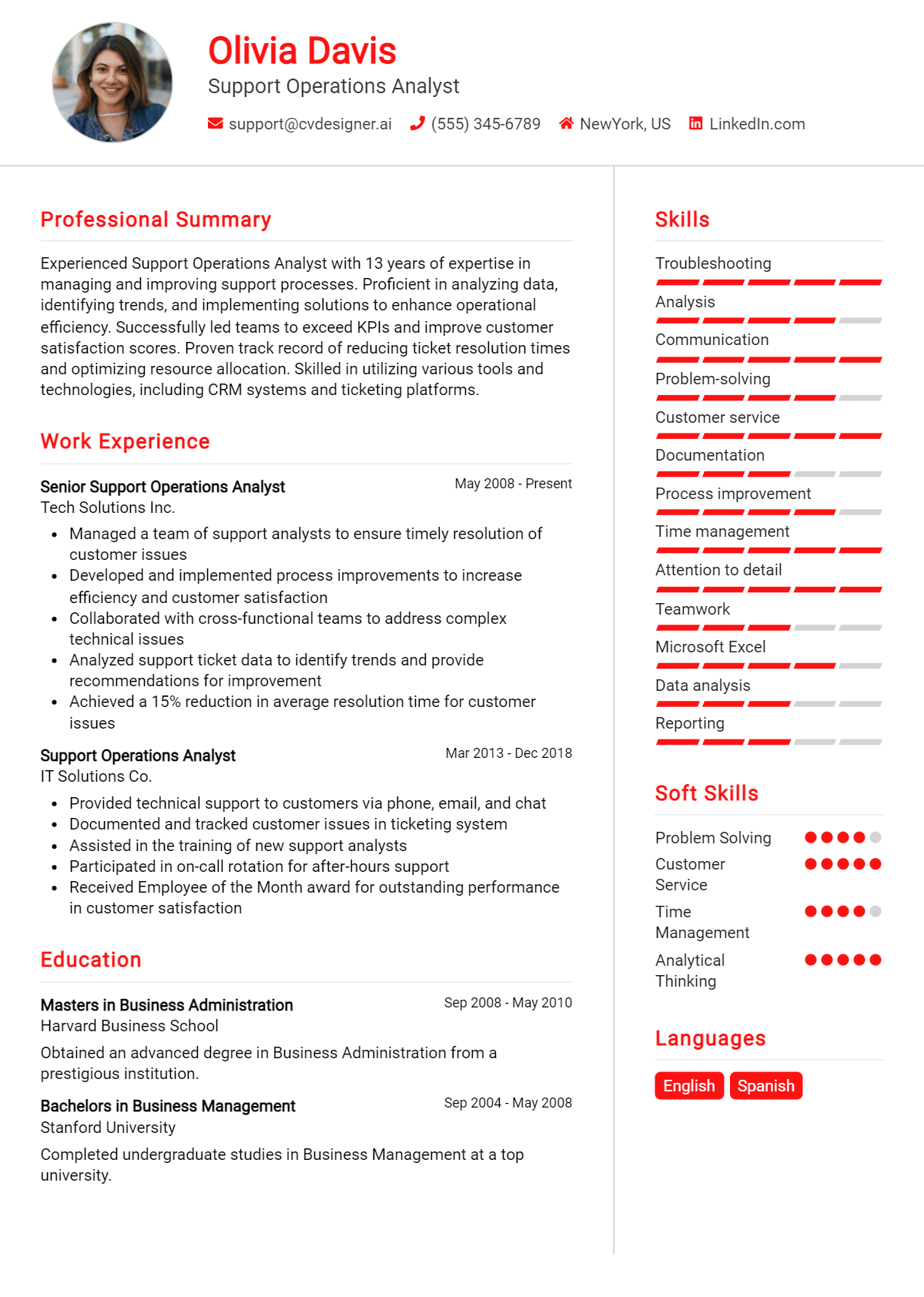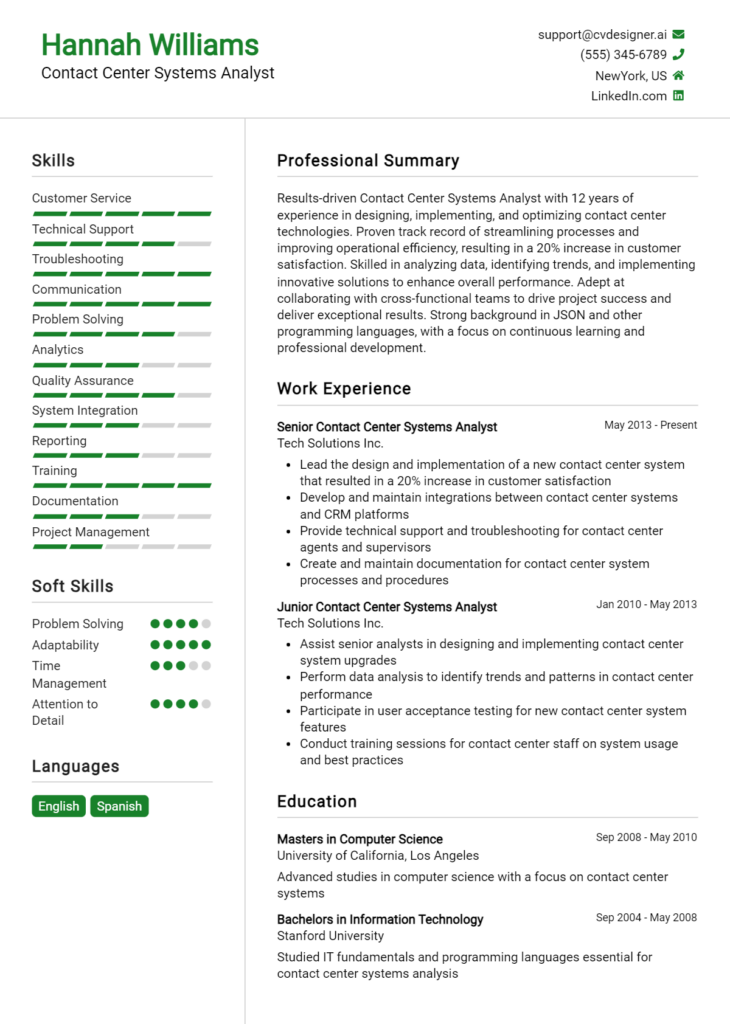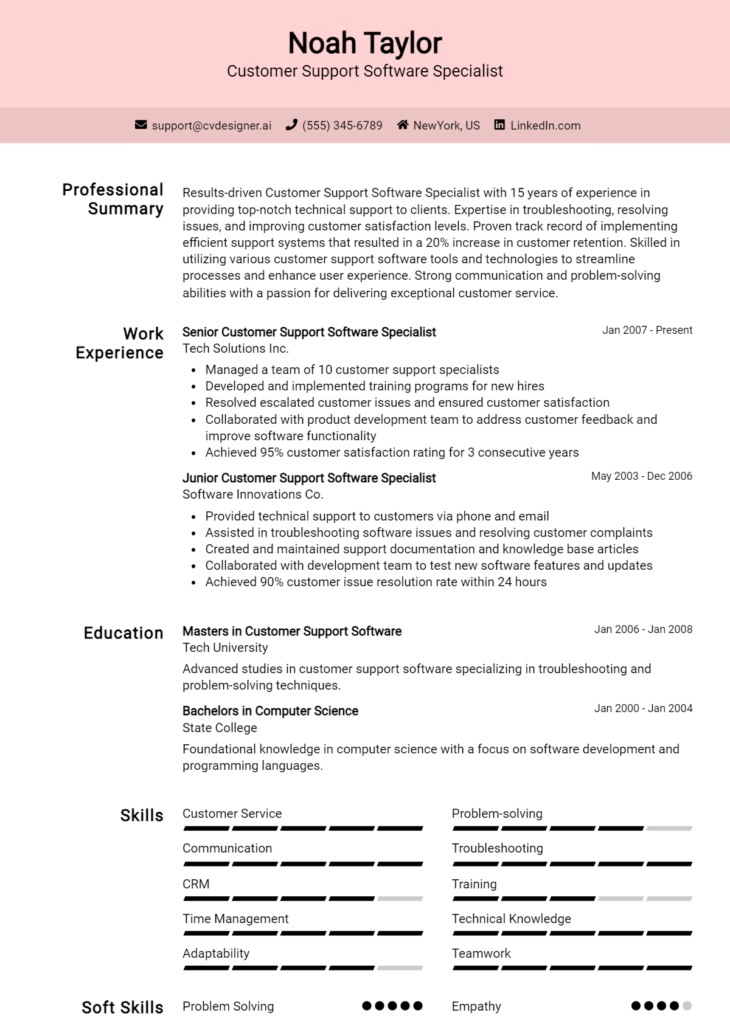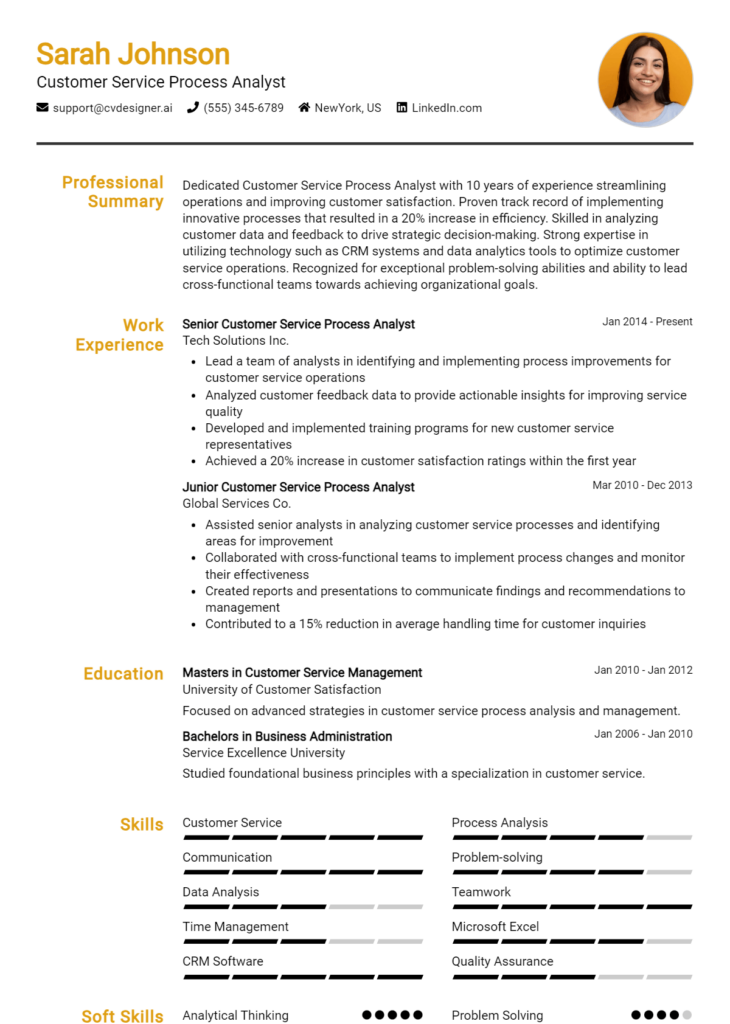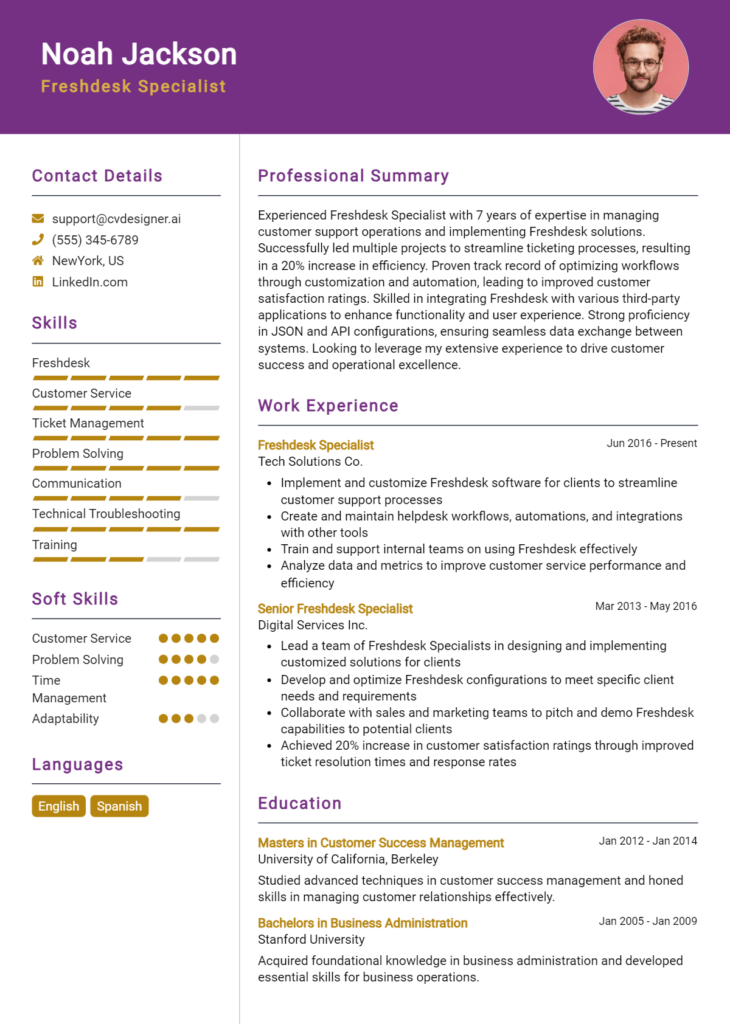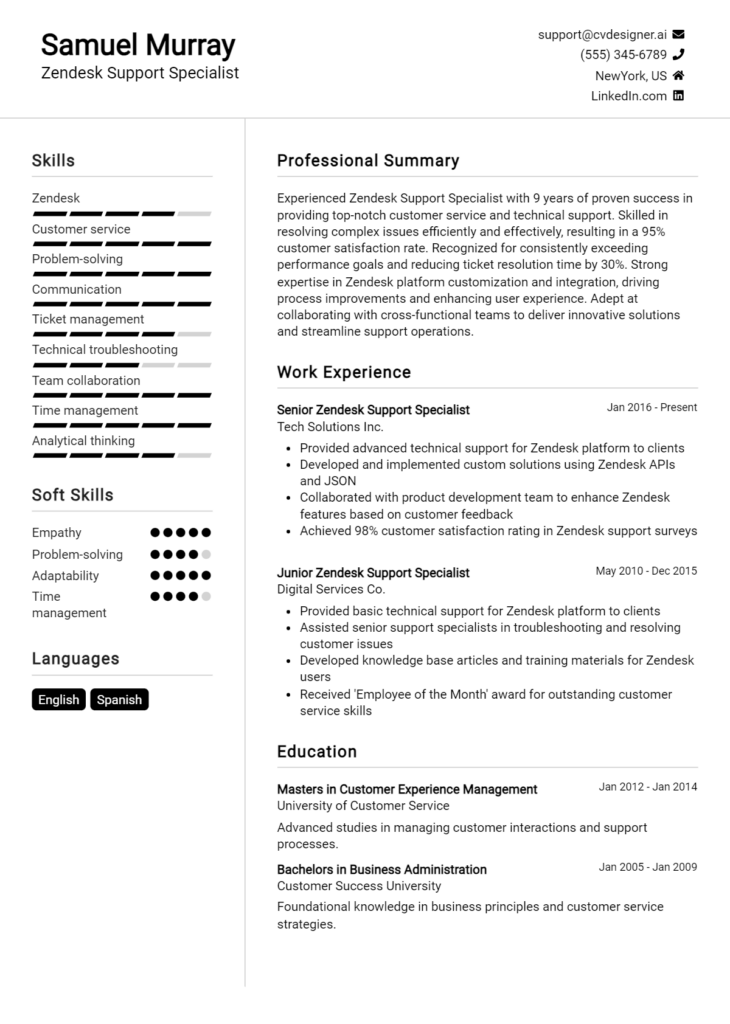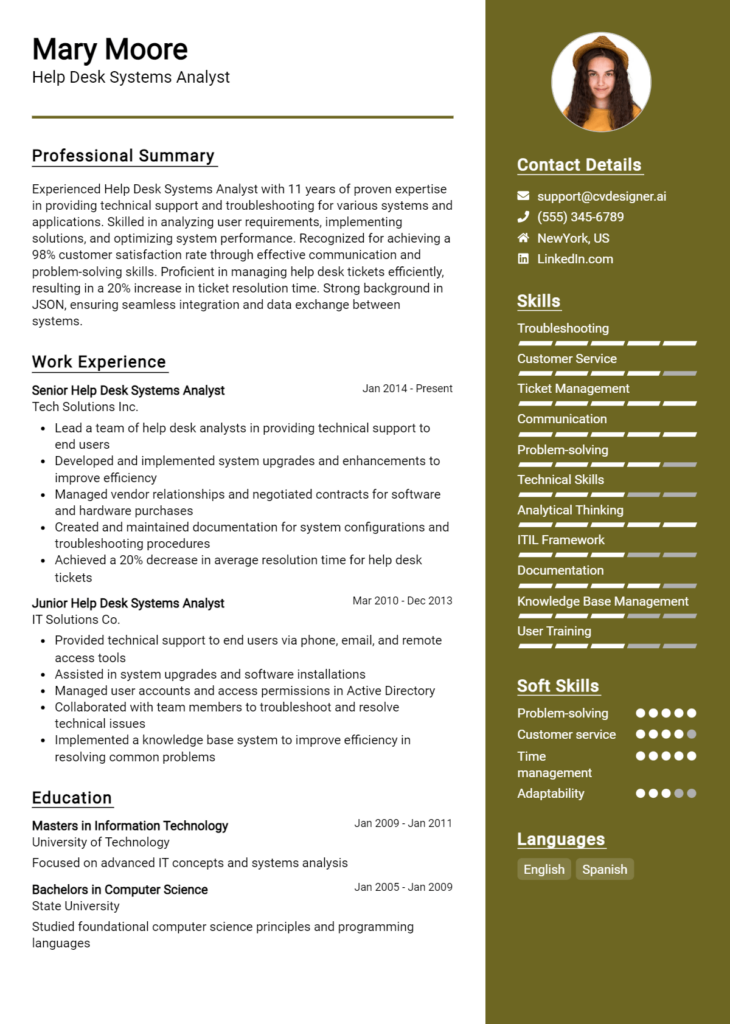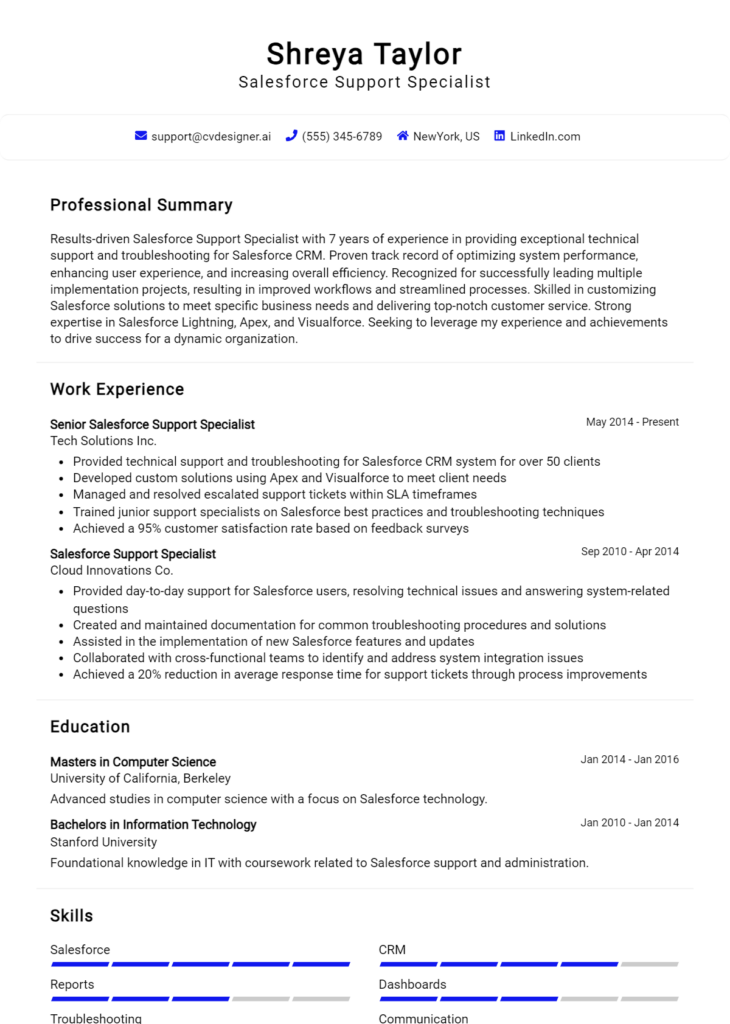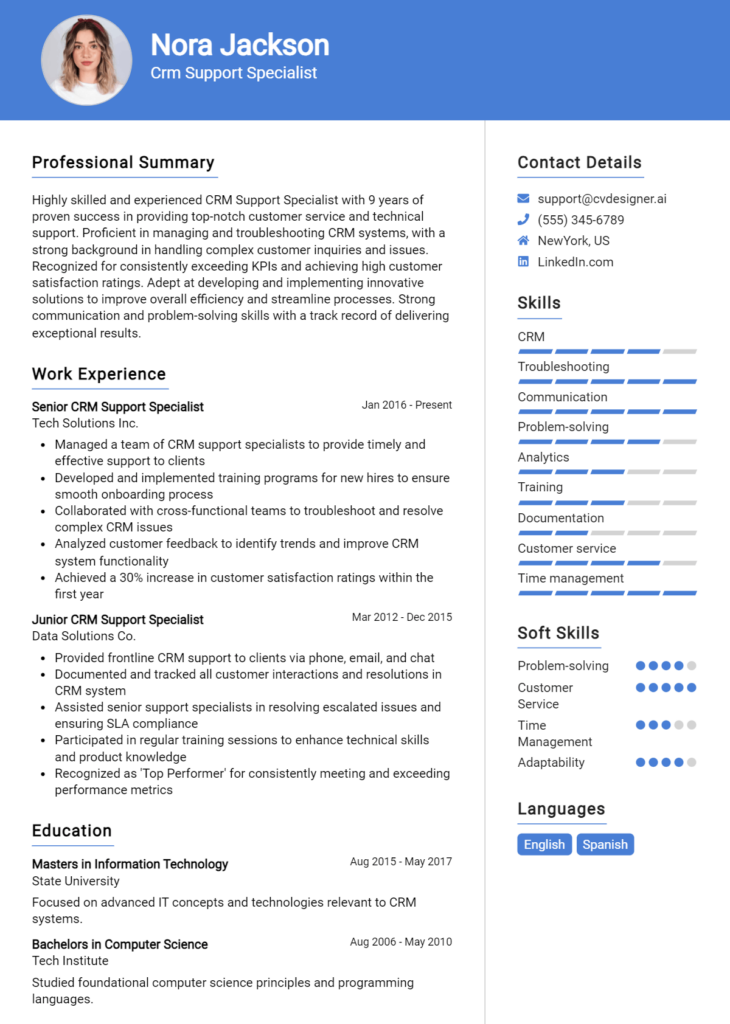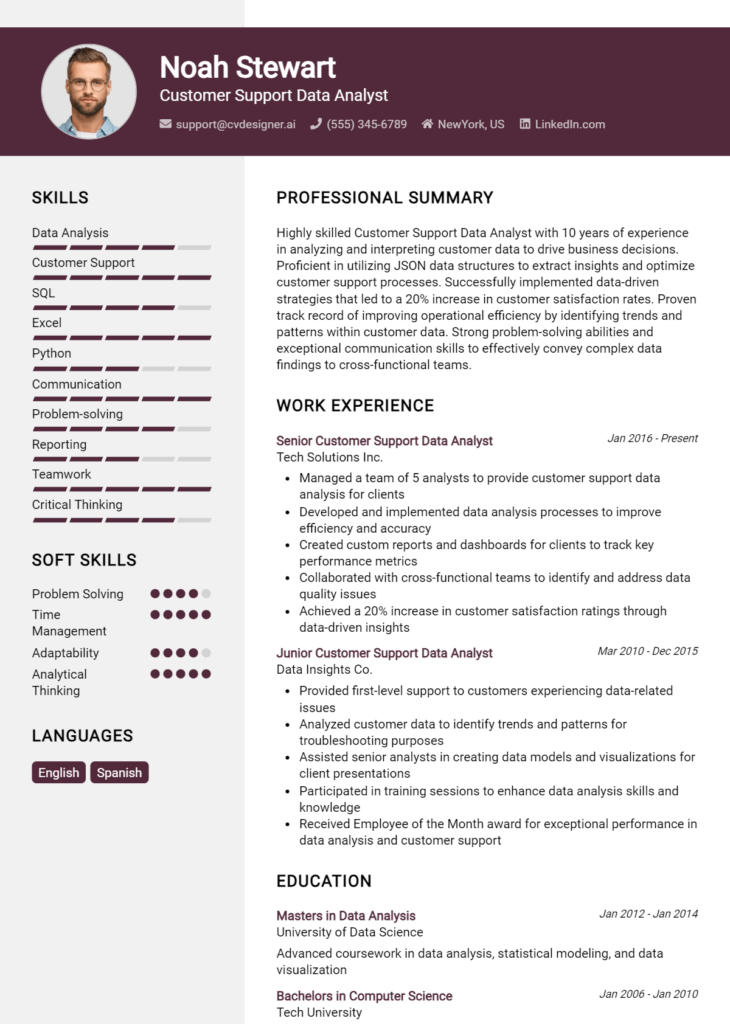Support Operations Analyst Core Responsibilities
A Support Operations Analyst plays a crucial role in ensuring seamless communication between various departments, including IT, customer service, and product management. Key responsibilities include analyzing operational processes, implementing efficiency improvements, and troubleshooting technical issues. Proficiency in data analysis, operational strategy, and problem-solving is essential for success in this role. These skills not only contribute to organizational goals but also enhance overall performance. A well-structured resume can effectively highlight these qualifications, showcasing the candidate's impact and readiness for the role.
Common Responsibilities Listed on Support Operations Analyst Resume
- Analyze and optimize support processes for efficiency and effectiveness.
- Collaborate with cross-functional teams to resolve operational issues.
- Monitor and report on key performance indicators (KPIs).
- Develop and maintain documentation for support workflows.
- Identify trends and recommend solutions for recurring problems.
- Assist in the implementation of new support tools and technologies.
- Conduct training sessions for support staff on new processes.
- Gather and analyze customer feedback to improve service levels.
- Ensure compliance with organizational policies and procedures.
- Support the preparation of business case analyses for operational changes.
- Participate in project management related to support initiatives.
- Facilitate communication between technical and non-technical teams.
High-Level Resume Tips for Support Operations Analyst Professionals
A well-crafted resume is crucial for Support Operations Analyst professionals, as it serves as the first impression a candidate makes on a potential employer. In a competitive job market, your resume must not only showcase your skills but also highlight your achievements, demonstrating how you can add value to an organization. This guide will provide practical and actionable resume tips specifically tailored for Support Operations Analyst professionals, ensuring that your application stands out and communicates your unique qualifications effectively.
Top Resume Tips for Support Operations Analyst Professionals
- Tailor your resume to match the specific job description by using relevant keywords and phrases.
- Highlight your relevant experience, focusing on roles that involved data analysis, customer support, or operational processes.
- Quantify your achievements by using metrics, such as percentage improvements or time savings, to demonstrate your impact.
- Showcase industry-specific skills, such as familiarity with CRM tools, data visualization software, and analytical techniques.
- Include a summary statement that clearly outlines your career goals and what you bring to the role of Support Operations Analyst.
- Use bullet points for clarity and to make your accomplishments easy to read and digest.
- Incorporate relevant certifications, training, or courses that enhance your qualifications in support operations and analytics.
- Demonstrate your problem-solving abilities by providing examples of how you’ve tackled challenges in past roles.
- Keep the format clean and professional, ensuring that your resume is visually appealing and easy to navigate.
By implementing these tips, you can significantly increase your chances of landing a job in the Support Operations Analyst field. A targeted and well-structured resume will not only showcase your qualifications but also convey your potential to contribute meaningfully to prospective employers, setting you apart from other candidates in the hiring process.
Why Resume Headlines & Titles are Important for Support Operations Analyst
In the competitive landscape of job applications, the role of a Support Operations Analyst demands a resume that stands out from the crowd. A well-crafted resume headline or title is crucial as it serves as the first impression for hiring managers. It succinctly summarizes the candidate’s key qualifications and skills in one impactful phrase, immediately grabbing the attention of potential employers. A strong headline should be concise and relevant, directly reflecting the requirements of the job being applied for, thus setting the stage for the rest of the resume and enhancing the candidate’s chances of being noticed.
Best Practices for Crafting Resume Headlines for Support Operations Analyst
- Keep it concise: Aim for a headline that is no longer than a single sentence.
- Be specific: Tailor the headline to reflect the specific skills and experiences relevant to the Support Operations Analyst role.
- Highlight key achievements: Include metrics or accomplishments that showcase your impact in previous roles.
- Use industry keywords: Incorporate relevant keywords that align with the job description to enhance visibility.
- Focus on your unique value: Clearly state what differentiates you from other candidates.
- Maintain professionalism: Avoid overly casual language; keep it formal and suitable for the industry.
- Consider your target audience: Tailor the headline to resonate with hiring managers and decision-makers in the support operations field.
- Revise and refine: Always revisit your headline to ensure it aligns with your current career goals and the job you are applying for.
Example Resume Headlines for Support Operations Analyst
Strong Resume Headlines
Results-Driven Support Operations Analyst with 5+ Years of Experience in Process Optimization
Customer-Centric Operations Analyst Specializing in Data Analysis and Performance Improvement
Proven Support Operations Specialist with a Track Record of Reducing Response Times by 30%
Skilled Operations Analyst with Expertise in Cross-Functional Collaboration and Project Management
Weak Resume Headlines
Support Analyst Looking for a Job
Experienced Professional Seeking Opportunities
The effectiveness of the strong headlines lies in their specificity and clarity; they convey the candidate's extensive experience and notable achievements, making a compelling case for their qualifications. In contrast, the weak headlines fail to impress because they lack detail and do not provide any insight into the candidate's strengths or relevance to the Support Operations Analyst role. By avoiding generic phrases and instead focusing on impactful accomplishments, candidates can significantly enhance their appeal to hiring managers.
Writing an Exceptional Support Operations Analyst Resume Summary
A well-crafted resume summary is crucial for a Support Operations Analyst as it serves as the first impression a hiring manager receives. In a competitive job market, a strong summary quickly captures attention by precisely showcasing the candidate's key skills, relevant experience, and notable accomplishments. It acts as a persuasive hook that encourages the employer to delve deeper into the resume. An effective summary should be concise, impactful, and tailored specifically to the job the candidate is applying for, ensuring that it aligns with the employer's expectations and needs.
Best Practices for Writing a Support Operations Analyst Resume Summary
- Quantify achievements: Use numbers and metrics to highlight your impact.
- Focus on relevant skills: Emphasize skills that are directly related to the Support Operations Analyst role.
- Tailor the summary for the job description: Customize your summary to reflect the specific requirements of the position.
- Keep it concise: Aim for 2-4 sentences that deliver your message effectively.
- Use action verbs: Start sentences with strong action verbs to demonstrate initiative and impact.
- Highlight industry knowledge: Mention familiarity with industry tools, software, or methodologies.
- Showcase problem-solving abilities: Illustrate your capability to address operational challenges.
- Incorporate soft skills: Include essential interpersonal skills such as communication and teamwork.
Example Support Operations Analyst Resume Summaries
Strong Resume Summaries
Detail-oriented Support Operations Analyst with over 5 years of experience in optimizing workflows and enhancing customer satisfaction. Achieved a 20% reduction in ticket resolution time through the implementation of a new support ticketing system.
Results-driven analyst skilled in data analysis and reporting, with a proven track record of increasing operational efficiency by 30% in a fast-paced tech environment. Proficient in using SQL and Tableau to derive actionable insights from complex datasets.
Dynamic Support Operations Analyst with a strong background in process improvement and project management. Led cross-functional teams to streamline operations, resulting in a 15% decrease in operational costs.
Weak Resume Summaries
Experienced analyst looking for a new position in support operations.
Support Operations Analyst with skills in various areas and a desire to help improve processes.
The strong resume summaries effectively highlight specific skills, quantify achievements, and demonstrate direct relevance to the Support Operations Analyst role, making them compelling to hiring managers. In contrast, the weak summaries lack detail, specificity, and measurable outcomes, rendering them generic and less appealing to potential employers.
Work Experience Section for Support Operations Analyst Resume
The work experience section is a critical component of a Support Operations Analyst resume, as it provides a comprehensive view of a candidate's technical expertise and their ability to manage teams effectively while delivering high-quality products. This section not only highlights specific skills relevant to support operations but also illustrates the candidate's contributions to their previous roles through quantifiable achievements. Aligning work experience with industry standards is essential, as it allows potential employers to gauge the candidate's fit for the role based on demonstrated success in similar environments.
Best Practices for Support Operations Analyst Work Experience
- Focus on relevant technical skills, such as data analysis, systems management, and software proficiency.
- Quantify achievements with specific metrics (e.g., reduced response time by 30% or increased customer satisfaction scores by 15%).
- Highlight collaborative projects that demonstrate teamwork and leadership abilities.
- Use action verbs to convey a sense of proactivity and impact (e.g., implemented, optimized, led).
- Tailor experiences to align with the job description, emphasizing skills and achievements that match the role.
- Include any relevant certifications or training that enhances your technical credibility.
- Showcase problem-solving skills by describing challenges faced and the solutions implemented.
- Keep descriptions concise and focused on outcomes rather than tasks.
Example Work Experiences for Support Operations Analyst
Strong Experiences
- Led a cross-functional team to implement a new ticketing system that improved response times by 40%, resulting in a 25% increase in customer satisfaction ratings.
- Developed and executed a data analytics framework that identified process inefficiencies, yielding a 15% reduction in operational costs over six months.
- Managed a project that integrated automated solutions into support workflows, reducing manual tasks by 50% and enhancing team productivity.
Weak Experiences
- Worked on various projects related to customer support.
- Assisted the team with daily operations and tasks.
- Participated in meetings to discuss support issues.
The examples of strong experiences are considered effective because they not only provide quantifiable outcomes but also demonstrate leadership and technical expertise in a collaborative setting. Each bullet point clearly outlines the candidate's impact on the organization, showcasing their ability to enhance operations and improve customer satisfaction. In contrast, the weak experiences lack specificity and measurable results, making them less compelling to potential employers. They fail to highlight the candidate's unique contributions or skills, which diminishes their overall impact on the resume.
Education and Certifications Section for Support Operations Analyst Resume
The education and certifications section of a Support Operations Analyst resume is crucial as it serves to showcase the candidate's academic qualifications and commitment to professional development. This section highlights the candidate's educational background, relevant coursework, and industry-recognized certifications, which can significantly enhance their credibility and alignment with the job role. By providing detailed information about specialized training and continuous learning efforts, candidates can demonstrate their preparedness for the challenges of the Support Operations Analyst position, making a strong impression on potential employers.
Best Practices for Support Operations Analyst Education and Certifications
- Focus on relevance: Include degrees and certifications directly related to support operations, data analysis, or related fields.
- Be specific: Provide information on coursework that pertains to analytical skills, operations management, and support technologies.
- Highlight advanced credentials: If applicable, showcase any specialized or advanced certifications that set you apart from other candidates.
- Include dates: Mention the years of graduation and certification attainment to demonstrate your timeline of education and ongoing learning.
- Prioritize industry-recognized certifications: Emphasize certifications from reputable organizations that are well-respected in the industry.
- Showcase continuous learning: Include any recent training or courses that reflect your dedication to staying updated with industry trends and technologies.
- Use clear formatting: Present your educational qualifications and certifications in a clean, organized manner for easy readability.
- Tailor to the job: Customize this section to reflect the specific qualifications mentioned in the job description or required by the employer.
Example Education and Certifications for Support Operations Analyst
Strong Examples
- Bachelor of Science in Information Technology, XYZ University, 2021
- Certified Support Operations Analyst (CSOA), National Support Association, 2022
- Courses: Data Analysis and Visualization, IT Service Management, Customer Relationship Management
- Project Management Professional (PMP), Project Management Institute, 2023
Weak Examples
- Bachelor of Arts in History, ABC College, 2000
- Outdated ITIL v2 Certification, 2010
- Completed a workshop on basic computer skills, 2018
- High School Diploma, 1995
The examples provided demonstrate a clear distinction between strong and weak qualifications. Strong examples highlight relevant degrees and certifications that align with the responsibilities and skills needed for a Support Operations Analyst, showcasing the candidate's readiness and expertise in the field. In contrast, weak examples illustrate a lack of relevance to the role, outdated certifications, or overly basic qualifications that do not support the candidate's capability to perform in a support operations environment.
Top Skills & Keywords for Support Operations Analyst Resume
In the competitive landscape of job applications, a well-crafted resume is essential for a Support Operations Analyst. Highlighting relevant skills not only showcases your capabilities but also aligns your profile with the expectations of potential employers. A solid resume emphasizes both hard and soft skills, allowing candidates to demonstrate their technical expertise and interpersonal abilities. As a Support Operations Analyst, possessing a balance of these skills can significantly enhance your chances of landing an interview, making it crucial to tailor your resume to reflect the most relevant qualifications for the role. For more insights on how to effectively present your skills and work experience, consider the following key attributes.
Top Hard & Soft Skills for Support Operations Analyst
Soft Skills
- Problem-Solving
- Communication
- Team Collaboration
- Adaptability
- Critical Thinking
- Time Management
- Attention to Detail
- Customer Service Orientation
- Analytical Mindset
- Conflict Resolution
- Empathy
- Interpersonal Skills
- Initiative
- Active Listening
- Flexibility
Hard Skills
- Data Analysis
- SQL and Database Management
- CRM Software Proficiency
- Technical Support Knowledge
- Incident Management Systems
- Reporting Tools (e.g., Tableau, Excel)
- Process Improvement Techniques
- Knowledge of ITIL Framework
- Familiarity with Help Desk Software
- Project Management Tools
- Scripting Languages (e.g., Python, Bash)
- Cybersecurity Awareness
- Performance Metrics Analysis
- Systems Troubleshooting
- Knowledge of API Integrations
- Cloud Computing Fundamentals
- Automation Tools (e.g., Jenkins, Ansible)
Stand Out with a Winning Support Operations Analyst Cover Letter
Dear Hiring Manager,
I am excited to apply for the Support Operations Analyst position at [Company Name]. With a strong background in data analysis and customer support operations, I am confident in my ability to contribute effectively to your team. My experience in streamlining processes and utilizing data-driven insights has consistently resulted in enhanced service delivery and improved customer satisfaction. I am particularly impressed by [Company Name]'s commitment to innovation and excellence in support services, and I am eager to bring my skills to such a forward-thinking organization.
In my previous role at [Previous Company Name], I successfully managed support operations by analyzing performance metrics and identifying areas for improvement. By implementing new reporting tools and refining existing processes, I was able to reduce ticket resolution times by 20% while maintaining high customer satisfaction ratings. My ability to collaborate with cross-functional teams enabled me to address systemic issues and create solutions that enhanced overall productivity. I believe my proactive approach and analytical mindset make me a perfect fit for the Support Operations Analyst role at [Company Name].
Furthermore, my proficiency in various data analysis tools and CRM systems allows me to derive actionable insights from complex datasets. I am adept at translating data into strategic recommendations that drive operational efficiency. My strong communication skills ensure that I can effectively share these insights with both technical and non-technical team members, fostering a collaborative environment that prioritizes exceptional customer experiences. I am passionate about leveraging technology to optimize support processes, and I am excited about the opportunity to contribute to [Company Name]’s mission of delivering outstanding service.
Thank you for considering my application. I look forward to the opportunity to discuss how my background and skills align with the needs of your team. I am eager to contribute to the continued success of [Company Name] and am excited about the possibility of joining your esteemed organization.
Sincerely,
[Your Name]
[Your Contact Information]
Common Mistakes to Avoid in a Support Operations Analyst Resume
When crafting a resume for a Support Operations Analyst position, it’s crucial to present your skills and experiences clearly and effectively. Many candidates, however, fall into common pitfalls that can detract from their qualifications. Understanding these mistakes can help you create a more compelling resume that stands out in a competitive job market. Here are some common mistakes to avoid:
Using a Generic Template: Relying on a one-size-fits-all template can make your resume look unoriginal. Tailor your resume to fit the specific job description and company culture.
Neglecting Relevant Experience: Failing to highlight relevant experience or skills specific to support operations can lead to missed opportunities. Ensure you demonstrate how your past roles have prepared you for this position.
Overloading with Technical Jargon: While technical skills are important, using too much jargon can confuse hiring managers. Aim for clarity and balance technical terms with accessible language.
Lack of Quantifiable Achievements: Simply listing responsibilities without showcasing accomplishments can weaken your resume. Use metrics and examples to illustrate your impact in previous roles.
Ignoring Keywords: Many companies use applicant tracking systems (ATS) to screen resumes. Not incorporating relevant keywords from the job listing can cause your resume to be overlooked.
Poor Formatting: A cluttered or overly complicated format can distract from your qualifications. Keep your resume clean and organized, using bullet points and headers for easy navigation.
Omitting Soft Skills: Technical abilities are essential, but soft skills like communication and problem-solving are equally important in support roles. Highlight these skills to show you are well-rounded.
Failure to Customize for Each Application: Sending the same resume to multiple employers can be detrimental. Customize your resume for each application to align with the specific job requirements and company values.
Conclusion
In this article, we explored the essential skills and responsibilities of a Support Operations Analyst, highlighting the importance of analytical thinking, problem-solving abilities, and effective communication in enhancing operational efficiency. We discussed the significance of data analysis in identifying trends and improving support processes, as well as the need for proficiency in tools and technologies that facilitate smooth operations.
As you prepare or refine your resume for a Support Operations Analyst position, it's crucial to ensure that it clearly showcases your relevant experience and skills. Take a moment to review your resume and consider how you can align it with the key competencies discussed.
To assist you in this endeavor, we encourage you to utilize the variety of resources available. Check out our resume templates for a polished layout, use our resume builder for an easy creation process, or explore our resume examples for inspiration on how to present your unique qualifications. Don't forget to enhance your application further with our professionally crafted cover letter templates.
Now is the perfect time to take action and make sure your resume stands out!

